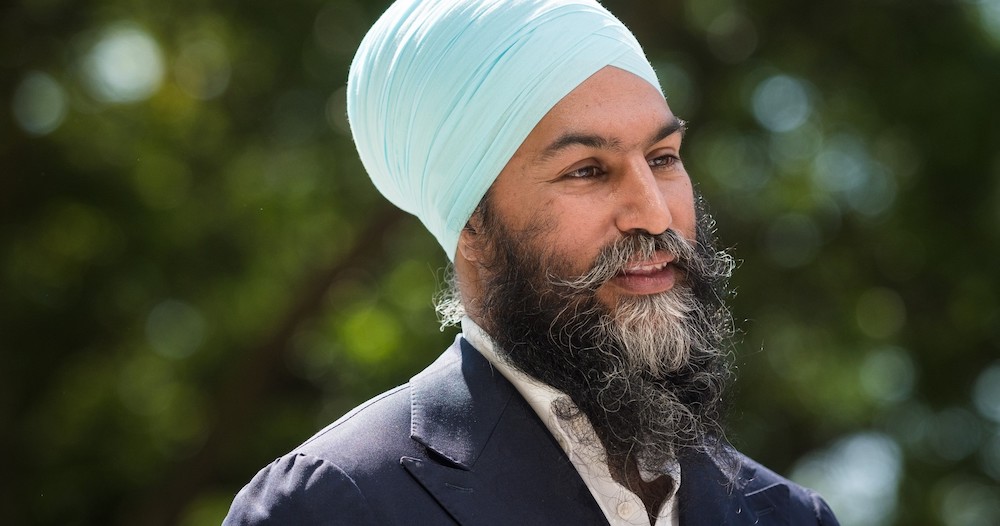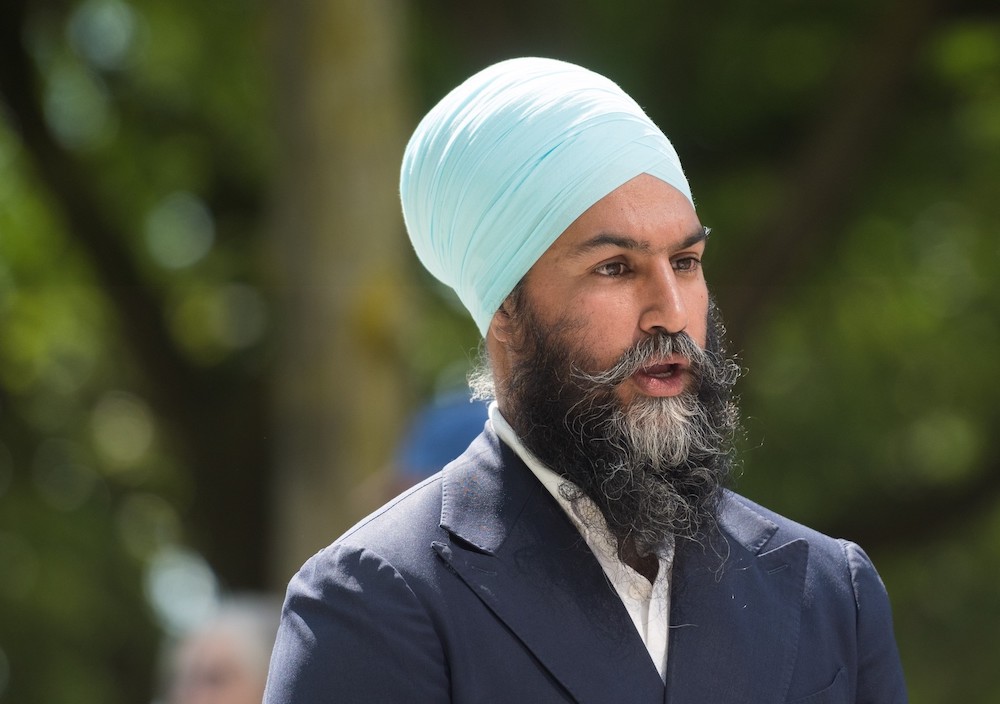Saturday was a busy day for federal New Democratic Party Leader Jagmeet Singh.
He was in Vancouver to both make an announcement on Canada’s housing crisis, which includes taxing foreign buyers and preventing money laundering from hiking real-estate prices, and reveal the long-awaited costing of his party’s 2021 election platform, which includes raising $166 billion in revenue over five years and nearly $215 billion in new spending on new programs — such as $38.5 billion to create universal pharmacare — over the same period.
It’s shaping up to be a pretty big year for Singh, who with his wife, Gurkiran Kaur Sidhu, is expecting their first child later this year. The 42-year-old, Toronto-born eighth national NDP leader is, as he would say, pumped about his party’s campaign to date, and on Saturday talked of a breakthrough on Sept. 20, election day. Here is his conversation with The Tyee, edited slightly for clarity.
The Tyee: In the leaders’ debate and on the campaign trail, Liberal Leader Justin Trudeau has positioned himself and his party as "progressives." Is that label accurate?
Jagmeet Singh: No, he’s not. Is it progressive to set [greenhouse gas emission-reduction] targets and then miss every one? Is it progressive to be the only leader of a G7 nation whose emissions have gone up every year? Is it progressive for him to say he will end fossil-fuel subsidies and then instead increase them to $900 million a year and subsidize the fossil-fuel sector even more than the Harper Conservatives?
People say to me, what’s the point of [Trudeau] saying all these great things if the result is we’re worse off than before? The climate crisis has gotten worse, the housing crisis has gotten worse.
On the climate crisis, the Liberals have been called out on what is viewed as a contradiction as fighting climate change while promoting pipelines.
I’m opposed to Trans Mountain.
[Singh didn’t speak about the controversial Coastal Gaslink LNG pipeline supported by B.C. Premier John Horgan. In the past he has expressed support for the project, which faces opposition from Wet'suwet'en hereditary Chiefs.]
You’re running for re-election in Burnaby South and the pipeline terminates in Burnaby. What are you hearing from folks in the riding?
Folks have said for a long time that they’re worried about the impact it’s going to have — increased tanker traffic on the whales. They’re worried about the impact on the environment. They’re worried about the lack of a plan to deal with a potential spill and what that would mean for the coast and the potential loss of jobs. A lot of people rely on the coast for work, and there’s an economic concern as well.
So would you cancel the expansion project? And, how do we migrate from pipelines to clean energy?
That’s a good question. We don’t know how far Justin Trudeau has taken the project, so as soon as we’re in government we’ll take a look at it and make the best decision for Canadians.
But our plan is that we need to be investing right away in renewable energy — in clean energy — and into creating jobs for workers because we know that the fossil-fuel industry is not the way. It’s not going to create jobs that are long lasting and it’s not going to be good for the planet.
Our plan is to immediately start creating jobs that will help energy and resource-sector workers have jobs now — remediating oil wells or converting some of the abandoned wells into geothermal energy — to help us create a more renewable future.
Jagmeet, you said "when you form government." I’ve heard your predecessors, Tom Mulcair and Jack Layton, say that too during election campaigns. But the polls are showing your party is in third place and not even close to forming a minority government. Very likely either the Liberals or Conservatives will be in that position on election day. Would you support either in Parliament?
I’ve said I am running for prime minister. This election is not over. People will make that decision. That will be their choice. But I want folks to know what I’ll be fighting for.
I’ll be fighting for a future where we are investing in creating good jobs that reduce emissions. I’ll be fighting for investments in health care, pharmacare, dental care. I’ll be fighting to make sure we tackle the housing crisis.
I think it’s clear with the evidence, another four years of Mr. Trudeau will make things worse. He has made things bad, and it’s going to get worse. So people can’t afford another four years of Trudeau. They certainly can’t afford an [Erin] O’Toole government.
So I’m encouraging people to vote [for] more New Democrats. We will make the super rich pay their fair share so we can invest that into what people need.
Would those priorities serve as a quid pro quo in exchange for propping up, say, another Trudeau minority government?
I’m letting folks know what I’m fighting for, which is to make people’s lives better — to make sure we’re fighting the climate crisis like we actually want to beat it.
And I’m saying to people the best way to do that is to vote for us. If you want any of these things done, we’re the ones that are fighting for it. We’re the ones that are going to deliver it.
There’s a week left until Election Day. What do you say to people worried that voting NDP splits off voters that might go Liberal and the Tories will come up the middle?
This is my thing — people mention this risk, and I can get that. But if you’re someone that’s worried about your future? A young person saying, “I’m legit worried. What’s the point of me going to school? What’s the point of me finding a partner? I don’t know what the world is going to look like for myself, let alone my kids.”
To that person, what does it matter if you’ve got a Mr. Trudeau who says he cares about the environment, but then misses every target — doesn’t end fossil-fuel subsidies — increases them? Puts a price on pollution, but exempts the biggest polluters?
How does that make that young person feel any better? In fact, I’ve spoken to young people who say, “I don’t feel any better knowing we’re the worst-performing G7 nation. I feel worse.”
The Liberals make this fear — be afraid of the Conservatives. I’m afraid of Justin Trudeau — and his inaction. I’m afraid he’s going to let our kids have no hope for the future. And kids are worried about that.
Let’s say we can do better. We don’t have to settle on bad and worse. You don’t have to buy into this notion that at least they’re not worse than the Conservatives. Sure, I’ll accept that. But they’re pretty bad — and pretty bad is not going to help us fight the climate crisis. Not going to help us fight the housing crisis. Not going to help us improve health care. Pretty bad is pretty bad.
So the greater threat is from the Conservatives than the Liberals?
The greater threat is not having enough New Democrats in Parliament to deliver on these things that people need. And the reason why I’ve got some proof on that is in the pandemic, the Liberals wanted a 10-per-cent wage subsidy. I fought them day in and day out saying that’s not enough to save jobs — and we got them up to 75 per cent. They wanted CERB to be $1,000. We fought to double that.
They wanted to end it last summer when people were still struggling; we fought to continue it. Without us there, people would have been left pretty high and dry.
I’m saying, folks, if you want any of these things that we’ve been talking about, the Liberals are not the path to achieving. New Democrats are — and more of us will make it happen.
What are you hearing from supporters, especially the younger base, about the prospects of a Liberal minority or a Conservative minority government — and your supporting either one?
I’m really hearing people say they voted Liberal in the past — and it’s one broken promise too many and it hurts.
It’s not just a broken promise. It’s being helpless. It’s feeling like things aren’t getting better and all the things they want to fix aren’t being fixed — and they’re feeling desperate. They’re like, I’m done with that. I’m not going to go vote for someone who keeps on letting us down. We’re going to try something different, and for me that’s really inspiring and gives me a lot of hope.
Okay then, here in the final days of the campaign, alert voters to two or three prime differences between New Democrats and Liberals.
The number one difference is in all the areas where we are struggling right now — whether it’s the climate crisis, health care or the rigged economy — the Liberals have supported the super rich, the powerful.

When it comes to housing, it is big money that is creating the problem. They’re flipping homes, they’re using it as a stock market — and the Liberals have not taken on the big money. When it comes to health, the pharmaceutical industry is opposed to universal pharmacare. We have been willing to take them on; the Liberals haven‘t. They caved in and voted against pharmacare, showing that they’re siding with the big pharmaceuticals.
The rigged economy is one where we’ve got the billionaires going into space and not paying their fair share. They’ve got loopholes; they’ve got offshore tax havens. With the environment, the biggest polluters are exempt by the Liberals’ [climate] plan.
Really what it comes down to is the Liberals have sided with the super wealthy time and time again. They voted against getting rid of the profit or the greed out of long-term care.
They’ve sided with for-profit long-term care; they’ve sided with the big wealthy pharmaceuticals; they’ve sided with the big polluters; they’ve sided with the billionaires.
When I put forward the idea of them paying their fair share, the Liberals voted against it.
So the big difference between us and the Liberals is that we’re willing to take on the powerful, the super rich, the big money in housing, the big polluters and we’re going to make them pay their fair share. The Liberals haven’t, the Conservatives won’t, and we are the ones who will do that.
You have a bit of a wind at your back in B.C. given that NDP Premier John Horgan’s government was re-elected with a supermajority last year during the pandemic. British Columbia is also the province where the NDP is polling the highest, more than anywhere else in Canada. Do you have your eye on any B.C. seats that the party could win back from the other parties?
Yeah, we’re feeling really excited. We’ve got some incredible candidates. Folks like Bonita Zarrillo, a city councillor in Port Moody-Coquitlam [won by Conservative Nelly Shin in 2019], who I’m sure will make a great voice in Ottawa.
We have a candidate in Nanaimo-Ladysmith, Lisa Marie Barron, who’s a rock star there. [The Greens’ Paul Manly won the riding in a 2019 byelection and was re-elected in the federal election later that year.]
In Kamloops-Thompson-Cariboo [which Conservative Cathy McLeod held since 2008], we have Bill Sundhu, who’s a rock star in his own right — a human-rights defender. He’s a lawyer.
Lots of great folks, lots of great candidates. I’m really excited about what that means for Canadians.
At the end of the day, British Columbians deserve a strong voice and we’ve got great folks.
And you’ve got Avi Lewis running in West Vancouver-Sunshine Coast-Sea to Sky Country.
And we’ve got Avi Lewis.
And David Suzuki is campaigning for him.
Yeah, there ya go. We’ve got lots of great folks out here. We’re stoked. We’re stoked about it all.
What do you think of the coverage of you from the mainstream media?
I’m getting a fair shake. People have been hearing what I stand for, and I’m OK with that.
Before last week’s English-language televised debate, CBC’s Vote Compass online survey of about 300,000 people revealed that you were the most trustworthy and competent of the federal major party leaders. The challenge for you is to translate that favourable rating into actual votes for your party.
What’s your plan in the final week of the campaign?
We just want to let folks know you can trust us.
We’ve been there for you in the pandemic. We fought for you in coming out of this pandemic. Lots of folks were wondering who’s going to pay for it. We’re the only party with a real plan that’s not going to mean cutting the help people need or putting more burden on them.
We’ve laid out a number of measures, including in four years [raising] over $160 billion in revenue. It’s going to help us invest in people and take on the challenges, and we’re the only party talking about the significant amount of increased revenue.
Where are you going to get that revenue?
Taxing the super rich. We’ve got a whole bunch of measures that we’ve laid out that have been costed by the PBO [parliamentary budget officer] — and each one of them shows a significant increase of revenue.
We’re talking closing loopholes, returning the capital-gains tax to what it was back in the 2000s. We’re talking higher enforcement. We’re looking at making sure companies like Amazon and the web giants are actually paying their fair share in Canada — an idea that France has started implementing by taxing the revenue these companies make in that country.
But I want to be clear we’re not looking at someone with a three-car garage. We’re talking about if you’ve got an offshore tax haven and you’re hiding your money, we’re going after that. We’re talking about Amazon, Google that make billions of dollars and don’t pay anything in Canada. These are companies we’re going after and this type of wealth we’re going after. We’re talking about the ultra-ultra rich. The people who were in the Panama Papers that Trudeau never prosecuted in the six years he was in government despite all the evidence of tax evasion.
It’s not going to be small businesses or working people or the middle class. ![]()
Read more: Politics, Federal Politics, Election 2021
















Tyee Commenting Guidelines
Comments that violate guidelines risk being deleted, and violations may result in a temporary or permanent user ban. Maintain the spirit of good conversation to stay in the discussion.
*Please note The Tyee is not a forum for spreading misinformation about COVID-19, denying its existence or minimizing its risk to public health.
Do:
Do not: